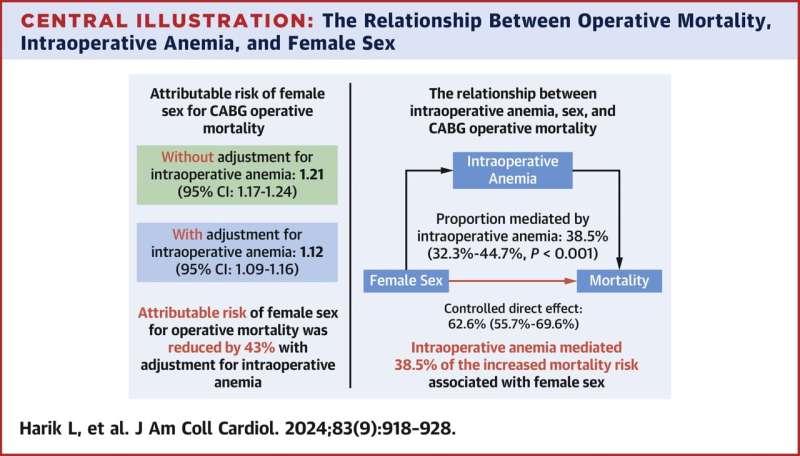This article has been reviewed according to Science X's editorial process and policies. Editors have highlighted the following attributes while ensuring the content's credibility:
fact-checked
peer-reviewed publication
trusted source
proofread
Anemia may contribute to higher female mortality during heart surgery

Women are at higher risk of death when undergoing heart bypass surgery than men. Researchers at Weill Cornell Medicine have determined that this disparity is mediated, to a large extent, by intraoperative anemia—the loss of red blood cells during surgery.
The study, published in the Journal of the American College of Cardiology, suggests that strategies for minimizing anemia that occurs during this procedure could lead to better outcomes for women with cardiovascular disease.
This study set out to discover why women are less likely to survive coronary artery bypass grafting, a surgical procedure for restoring blood flow to the heart. The team, led by senior author Dr. Mario Gaudino, the Stephen and Suzanne Weiss Professor in Cardiothoracic Surgery at Weill Cornell Medicine, analyzed information obtained from the Society of Thoracic Surgeons Adult Cardiac Surgery Database on more than one million patients. Dr. Lamia Harik, a fellow in Cardiothoracic Surgery Research at Weill Cornell Medicine, was the first author of the paper.
They examined patient demographics (such as age and ethnicity), risk factors (including disease severity, previous heart attacks, and the co-occurrence of other health conditions), and surgical data (including the time spent on the bypass machine and the volume of the components of blood, such as red blood cells).
Crunching the numbers, Dr. Gaudino and his team previously confirmed that women had higher mortality associated with the procedure than men: 2.8 percent versus 1.7 percent, a nearly 50 percent difference. Now, using sophisticated statistical analyses to assess all the possible variables, the researchers found that a substantial portion of this enhanced risk—38 percent—could be attributed to severe intraoperative anemia.
This depletion of red blood cells is an inevitable side effect of using blood-diluting fluids to prime the heart-lung bypass machine that takes over the job of pumping blood throughout the body during surgery. Women may be even more susceptible to the effects of intraoperative anemia because they tend to arrive in surgery with lower red blood cell counts and have smaller body size compared to their male counterparts.
The study does not establish that intraoperative anemia is causing greater female mortality, but the two factors are associated. It suggests that clinicians and researchers should consider interventions to prevent or minimize severe intraoperative anemia, which can lead to dangerously reduced oxygen delivery to the body's tissues, including the heart.
Using heart-lung bypass machines with shorter circuits, for example, would limit the volume of blood-diluting solution needed to run the pump. Randomized trials to assess whether methods for curtailing anemia could improve outcomes for women undergoing heart bypass surgery are "urgently needed," wrote Dr. Gaudino, who is also a cardiovascular surgeon at NewYork-Presbyterian/Weill Cornell Medical Center.
More information: Lamia Harik et al, Intraoperative Anemia Mediates Sex Disparity in Operative Mortality After Coronary Artery Bypass Grafting, Journal of the American College of Cardiology (2024). DOI: 10.1016/j.jacc.2023.12.032
10.1001/jamasurg.2022.8156


















